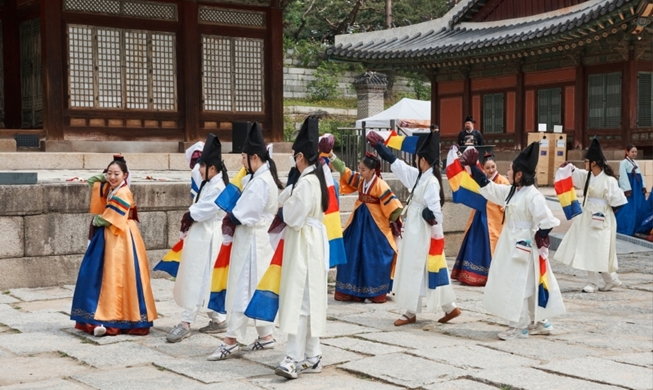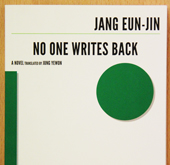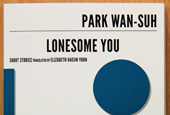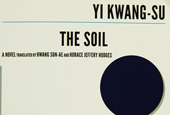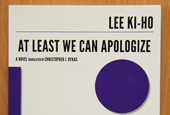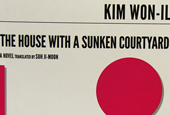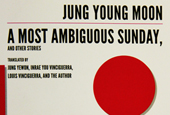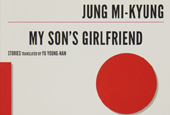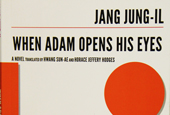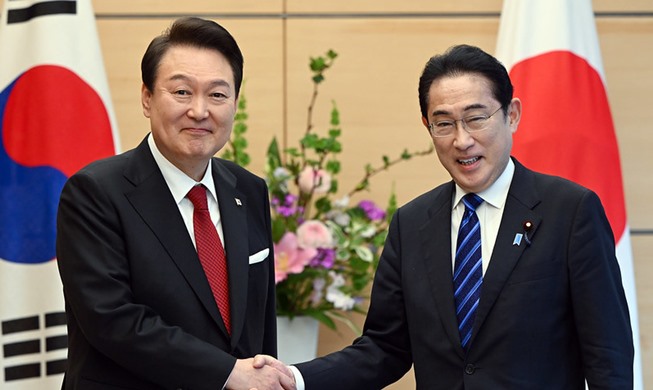-
 Korea.net's 24-hour YouTube channel
Korea.net's 24-hour YouTube channel- NEWS FOCUS
- ABOUT KOREA
- EVENTS
- RESOURCES
- GOVERNMENT
- ABOUT US
There is a new piece of literature being much read by French audiences these days: the full-length novel “No Matter Where You Are” (unofficial translation), penned by Lee Seung-u.
The novel was first published in French by Paris-based publisher Editions Zulma in 2012. Last year, the novel was also included in the prestigious Folio series, a collection of world-class literary works by Editions Gallimard, another leading French publisher.
With that inclusion, the writer has now become the first Korean to have two of his many works placed in the honorable series, the other being his 2000 novel “The Private Life of Plants.”
The Folio series, initiated back in 1972, has so far brought to French readers some of the world’s most acclaimed works of literature from more than 60 countries, including France. Masterpieces by great writers, such as Albert Camus, Ernest Hemingway and George Orwell, have all been introduced in its pages.
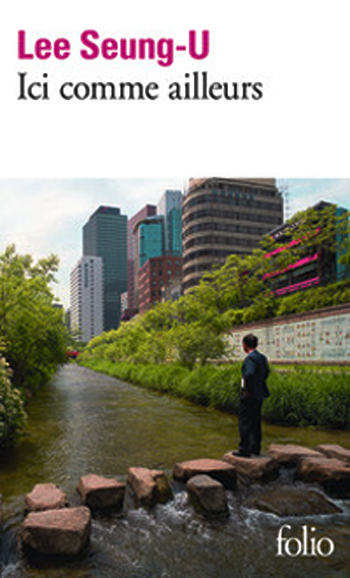 Lee’s novel “No Matter Where You Are” focuses on Yu, the main character, a man who has been demoted in his workplace for being a misfit and has been sent against his will to work for the company in the remote village of Seori, located in the westernmost tip of the Korean Peninsula.
Lee’s novel “No Matter Where You Are” focuses on Yu, the main character, a man who has been demoted in his workplace for being a misfit and has been sent against his will to work for the company in the remote village of Seori, located in the westernmost tip of the Korean Peninsula.
A series of ridiculous things happen to Yu: his wife leaves him for her ex-husband, so he has to leave for Seori alone; when he gets to the strange town, he cannot contact his predecessor, who is supposed to hand over the work load; and, he even has his wallet stolen at an inn where he stays for a night.
The poor guy, who was just an ordinary husband and worker a few days ago, ends up penniless. One day, he comes across an old, insane man named Noah, who lives in a cave and makes gravestones that are, “a safe haven for souls.” Noah believes that the end of the world draws closer. Yu begins to help build the stones, just like the mad man.
Yu repeatedly asks himself, “When something that has been familiar to me suddenly turns into something strange and unfamiliar, and when the relationships that I’ve tended for so long suddenly become totally irrelevant to me, where on earth am I now?”
“I know who I am, but when I realize that I cannot let others know who I am, I feel as if something heavy and blunt has hit my head. If nobody takes me for who I am, what good is it that I myself know who I am? If nobody but me knows who I am, how can I know that the ‘me’ I’ve known for so long is the real me? How can I make them believe it?” Yu repeatedly asks. The fact that his existence itself has become obscure in such a flash gives him chills all over.
(quoted from “No Matter Where You Are”)
Yu explains why he won’t leave Seori: he has lost his wallet. However, he never had any intention to leave in the first place. For him, Seori is a place from which he cannot escape, no matter how hard he tries. It is like a swamp he keeps falling into.
“No matter how intolerable it may be, the place you are, your physical location, is the life you have to live through and have to endure. That’s life. That’s the way it is,” said the author. “It doesn’t matter where you are. It only matters how you push through the reality that lies before your eyes, every day.”
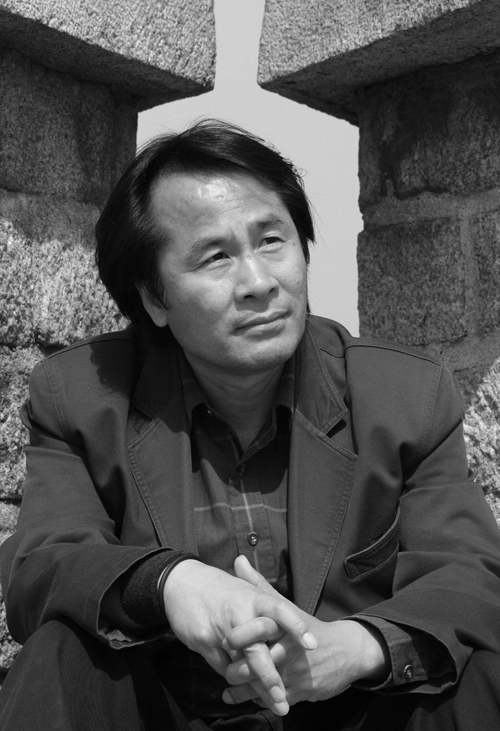
The author of this great book was born in 1959 in Jangheung-gun, Jeollanam-do (South Jeolla Province). He graduated from Seoul Theological University and studied at Yonsei University’s Graduate School of Theology for a while, attaining no degree in the end. His literary career started in 1981 with his novel “A Portrait of Erysichton,” which received the New Writer of the Year award. Now, he serves as a Creative Writing professor at Chosun University in Gwangju.
Lee has written more than 17 novels and short story collections. His novel “The Reverse Side of Life” (1992) and a collection of short stories, “A Conjecture Regarding Labyrinth” (1994), in particular, have gained him global recognition as they have been published in Europe and the U.S.
His other works include the short story collections “Mr. Koo Pyeongmok’s Cockroach” (1987) and “Magnolia Park” (1998), as well as his collection of essays “You’ve Already Started Writing A Novel” (2006).
By Sohn JiAe
Korea.net Staff Writer
jiae5853@korea.kr
The novel was first published in French by Paris-based publisher Editions Zulma in 2012. Last year, the novel was also included in the prestigious Folio series, a collection of world-class literary works by Editions Gallimard, another leading French publisher.
With that inclusion, the writer has now become the first Korean to have two of his many works placed in the honorable series, the other being his 2000 novel “The Private Life of Plants.”
The Folio series, initiated back in 1972, has so far brought to French readers some of the world’s most acclaimed works of literature from more than 60 countries, including France. Masterpieces by great writers, such as Albert Camus, Ernest Hemingway and George Orwell, have all been introduced in its pages.

Lee Seung-u’s novel “No Matter Where You Are” was published in French in 2012 and was also included in last year’s prestigious Folio collection of masterpieces. (photo courtesy of the Daesan Foundation)
A series of ridiculous things happen to Yu: his wife leaves him for her ex-husband, so he has to leave for Seori alone; when he gets to the strange town, he cannot contact his predecessor, who is supposed to hand over the work load; and, he even has his wallet stolen at an inn where he stays for a night.
The poor guy, who was just an ordinary husband and worker a few days ago, ends up penniless. One day, he comes across an old, insane man named Noah, who lives in a cave and makes gravestones that are, “a safe haven for souls.” Noah believes that the end of the world draws closer. Yu begins to help build the stones, just like the mad man.
Yu repeatedly asks himself, “When something that has been familiar to me suddenly turns into something strange and unfamiliar, and when the relationships that I’ve tended for so long suddenly become totally irrelevant to me, where on earth am I now?”
“I know who I am, but when I realize that I cannot let others know who I am, I feel as if something heavy and blunt has hit my head. If nobody takes me for who I am, what good is it that I myself know who I am? If nobody but me knows who I am, how can I know that the ‘me’ I’ve known for so long is the real me? How can I make them believe it?” Yu repeatedly asks. The fact that his existence itself has become obscure in such a flash gives him chills all over.
(quoted from “No Matter Where You Are”)
Yu explains why he won’t leave Seori: he has lost his wallet. However, he never had any intention to leave in the first place. For him, Seori is a place from which he cannot escape, no matter how hard he tries. It is like a swamp he keeps falling into.
“No matter how intolerable it may be, the place you are, your physical location, is the life you have to live through and have to endure. That’s life. That’s the way it is,” said the author. “It doesn’t matter where you are. It only matters how you push through the reality that lies before your eyes, every day.”

Writer Lee Seung-u (photo courtesy of the Daesan Foundation)
The author of this great book was born in 1959 in Jangheung-gun, Jeollanam-do (South Jeolla Province). He graduated from Seoul Theological University and studied at Yonsei University’s Graduate School of Theology for a while, attaining no degree in the end. His literary career started in 1981 with his novel “A Portrait of Erysichton,” which received the New Writer of the Year award. Now, he serves as a Creative Writing professor at Chosun University in Gwangju.
Lee has written more than 17 novels and short story collections. His novel “The Reverse Side of Life” (1992) and a collection of short stories, “A Conjecture Regarding Labyrinth” (1994), in particular, have gained him global recognition as they have been published in Europe and the U.S.
His other works include the short story collections “Mr. Koo Pyeongmok’s Cockroach” (1987) and “Magnolia Park” (1998), as well as his collection of essays “You’ve Already Started Writing A Novel” (2006).
By Sohn JiAe
Korea.net Staff Writer
jiae5853@korea.kr
Related Contents
Most popular
- China warmly welcomes first Korea-born giant panda Fu Bao
- First hearing-impaired K-pop act hopes for 'barrier-free world'
- Novelist Hwang's 'Mater 2-10' shortlisted for Int'l Booker Prize
- Expats could account for 7% of population in 20 years: report
- Nat'l Fire Agency picks 137 elite staff for deployment abroad








